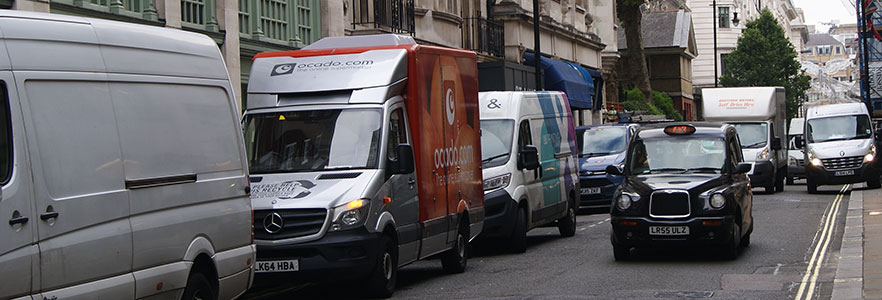Online retail continues to grow, and office deliveries are understandably popular with city workers as a convenient way of receiving online purchases. However, this surge in e-commerce means an increasing number of delivery vehicles fill city streets, creating congestion, additional road safety risks and increased vehicle emissions. In fact, London breached its annual safe air quality limit for 2017 in the first five days of the year.

Environmental impact
Newcastle University research shows that online shopping can only be environmentally sustainable if more than 25 items are placed in a single order, otherwise the impact on the environment is worse than physically driving to the shops.
Arup’s internal research shows that 40% of all packages received at the firm’s offices are employees’ personal purchases, increasing to 60% during the festive season. It’s a worldwide problem, causing traffic congestion on American city streets such as New York and San Francisco.
Awareness of the problem
I believe we need to create greater awareness of the problems this behaviour causes, help organisations and retailers to change mind-sets, and ultimately re-route deliveries away from urban centres to convenient click-and-collect locations closer to homes.
From our partners:
In London, the congestion reduction gains made by the city’s Congestion Charge in its first decade are being eroded in part by the growth in delivery vehicles. A report published by the London Assembly, shows that retail deliveries grew by 11% from 2012-2015. Showing leadership on the issue, the Transport Committee has proposed a ban on Transport for London employees receiving personal deliveries to the workplace.
Retailers’ flexible and easy delivery terms, including no-cost returns, are driving greater numbers of speculative purchases, particularly for clothing and footwear. And rapid, personalised delivery means retailers don’t consolidate goods into fewer, less polluting and more environmentally sustainable deliveries. Consumer behaviour therefore unwittingly drives increased air pollution. Retailers do not mention the negative role played by ecommerce deliveries so shoppers do not make the connection.
Solutions to city pollution
One solution is click-and-collect centres that receive consolidated goods in larger shipments from retailers, reducing the number of journeys, while offering the purchaser the flexibility to pick up near their home at a convenient time. These consolidation businesses increasingly offer conveniently located, late-opening locations to pick up packages near people’s homes. Some even offer changing room facilities to allow clothing to be tried or returned on the premises. One such company, Doddle, suggest their click-and-collect model would take 31,000 vans off UK roads during the busy months of November and December.
A hearts-and-minds effort will be needed to encourage city workers and other consumers to use existing local click-and-collect services. In the longer term suppliers and couriers should be promoting solutions that value sustainable practice and efficiency over a rapid, 24/7 economy consumer-driven mind-set – similar to what Ask Absolutely’s bike courier service provides.
The negative consequences of our growing addiction to online retail – from poor air quality to road accidents – will also need to be communicated more widely. With a rapidly proliferating number of online-delivery retailers and services, from Amazon to Uber Eats, I believe it’s vital that an informed public responds by choosing more responsible, sustainable delivery options.
Next time you order online, think: what impact is my delivery having on the quality of our air and the traffic in our streets?
How would you change your online shopping behaviour to reduce pollution?
This article is written by Kate Sanderson & originally appeared in Arup.

















